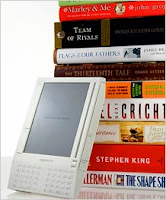 The Kindle is an electronic book reader launched by Amazon.com which uses an E Ink display and downloads content over the free Amazon Whispernet, which uses the Sprint EVDO network. The Kindle weighs 10.3 oz (292 g) and its battery lasts two days with wireless on, one week with wireless off, and charges in two hours. A computer is not required (source: Wikipedia). Read David Pogue' review in the New York Times.
The Kindle is an electronic book reader launched by Amazon.com which uses an E Ink display and downloads content over the free Amazon Whispernet, which uses the Sprint EVDO network. The Kindle weighs 10.3 oz (292 g) and its battery lasts two days with wireless on, one week with wireless off, and charges in two hours. A computer is not required (source: Wikipedia). Read David Pogue' review in the New York Times.Mike Torres describes it well:
"So far, I'm really liking what I'm seeing with the Kindle. The price is still way too high (as was the price of the original iPod) but the promise of a 10 ounce device that can store 200+ books is really... well, promising.
Digital books are the future. Just like I've cleared my home of all CDs and gone 100% digital, I can't wait to do the same thing with books. It's the side of me that just hates having "stuff" everywhere. When given the option between a physical artifact or a bunch of bytes, I almost always choose bytes."
The Kindle store includes 88,000+ books including some medical titles. We will see how the new device plays on the market but if you are a medical student/resident, it would be nice to have all your favorite textbooks on one 10-once device. Russell Beattie is right that eBooks need more contrast to take off though.
The Kindle has an MP3 player and works with audio books bought from Audible.com. MS Word documents and the common photo formats are also supported via email (it costs 10 cents per file). Amazon will need to add PDF support and a text-to-speech program.
The device has a browser based on NetFront (a mobile browser) but it looks likes using the Internet beyond the Kindle store will incur extra charges according to the Amazon's terms of service.
Video: jkOnTheRun looks at the Amazon Kindle
Walt Mossberg from WSJ reviews the Kindle
References:
An E-Book Reader That Just May Catch On. NYTimes.
Amazon Kindle - a revolution? Torres Talking.
eBooks need more contrast to take off. Russell Beattie’s Weblog.
Amazon Kindle from Wikipedia, the free encyclopedia.
Mowser on Kindle. Russell Beattie’s Weblog.
Kindle, take 2. Diego's weblog.
100 Notable Books of the Year. NYTimes.
The Future of Reading. Newsweek.
Dear Jeff Bezos (one-week Kindle review). Scobleizer, 11/25/2007.
Amazon's Kindle Makes Buying E-Books Easy, Reading Them Hard. Walt Mossberg, WSJ, 11/2007.
Image source: Amazon.com.
Related:
Hack Your Kindle: 100+ Tips, Resources, and Tutorials to Get More Out of the Amazon Kindle. CollegeDegrees.com, 06/2008.
The Kindle for Medical Education. Life as a Healthcare CIO, 10/2008.
Turning Page, E-Books Start to Take Hold. NYTimes, 12/2008.
How to Read Free Books from Project Gutenberg on the Amazon Kindle http://bit.ly/jH8Hy
Investigating the art of the audiobook - Audible founder reports 40% growth in unit sales every year http://goo.gl/q1Iqh